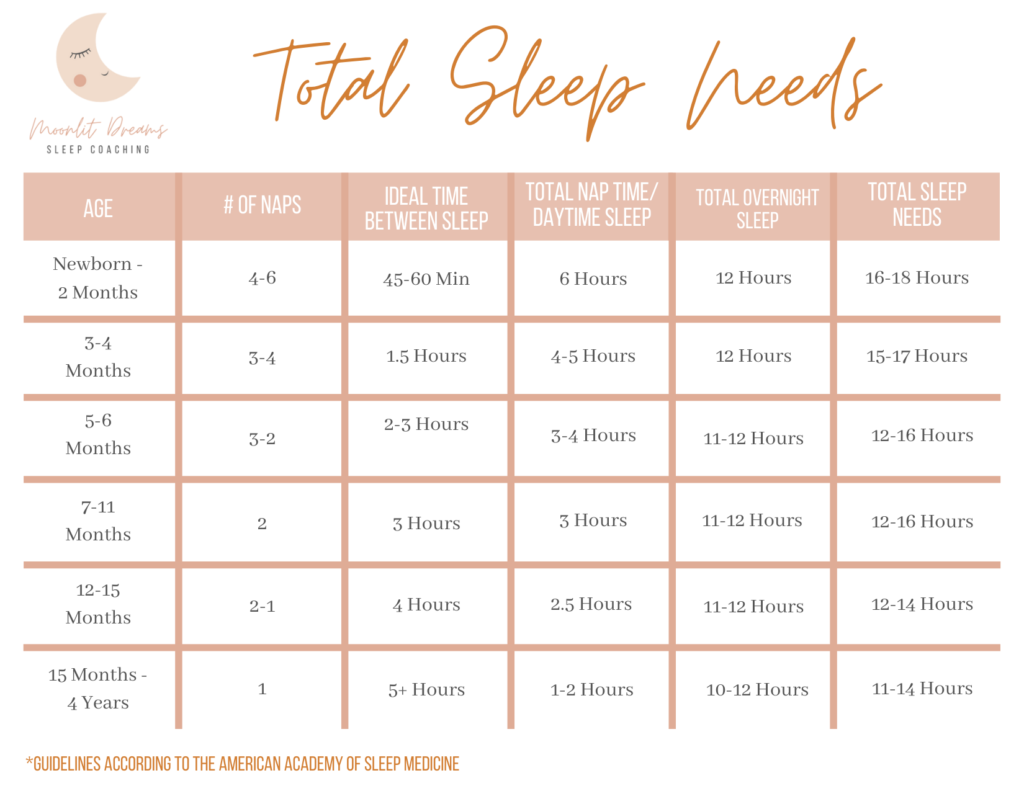Early morning wakings is something A LOT of parents struggle with. Whether it’s an early rising toddler that is ready to start their day at 5:30am, or an infant that can’t seem to sleep past 4:00, it’s hard and it takes a toll on the whole family. In this blog I am going to touch on a few reasons why your child could be waking so early, as well as provide a few tips on how to fix it.
Is Your Timing Off?
How you structure your child’s naps and bedtime are going to be critical in avoiding those early morning wakings. The biggest culprit here is always going to be a child who is overtired especially when you misalign a nap or bedtime. Once your child falls into an overtired state, their little bodies start firing off stimulant hormones which cause their brain and their bodies to fight each other for sleep. A child who is overtired is usually going to protest a nap and or bedtime, wake overnight, and wake early. Understanding and paying attention to the proper awake windows for your child’s age is always my #1 suggestion when you are reevaluating their sleep and their schedule. This means that you should ensure the timing of their naps, and bedtime, are appropriate for their age as well. Let’s say you have a 2 year old that is going to bed at 7pm and they only need 10-11 hours of overnight sleep, then they are likely waking up at 5am ready to start the day because they’ve slept enough for their age. In a case like this, pushing their bedtime out by 30-60 minutes can be beneficial since a child at that age can go somewhere between 4-5.5 hours between sleep. I have included a sample of my Total Sleep Needs chart below, but you can also download it here. If you are interested in what a typical day should look like for your child, take my schedule generator quiz to download your personalized sample schedule here!

Undertired vs Overtired
While a child being overtired is usually the biggest culprit for most sleep struggles, a child who is undertired can cause issues as well. During your child’s awake hours, they are building up sleep pressure. So, if your child’s awake window is typically 5 hours, but you are putting them down after 3 hours, they will not have built up enough sleep pressure to be tired enough for sleep and they will either end up protesting, taking a long time to fall asleep, or if they do fall asleep they wake up soon after because they are undertired. This is why you’ll want to ensure that the awake windows you are using for your child are appropriate for their age. Some parents will see their child rubbing their eyes or yawning, and take that as a queue that they are ready for sleep, but they haven’t built up enough sleep pressure and end up being undertired. So, if your child starts to show these “signs”, but it’s nowhere near nap time, it could simply mean that they’re bored and need to play a new game or go outside. On the flip side of that, if you know that your child has surpassed their appropriate awake window, but you are waiting for them to start rubbing their eyes and yawning or get fussy before you put them down, you’re entering the danger zone. Never mistake your little one not “looking” or “acting” tired at nap time or bedtime and think they can make it a few more hours – IT’S A TRAP! They will fall into overtired and you will have a child that is protesting going down, waking overnight, and waking early. I’m sure you have been told “Oh, just keep them up later, and then they’ll sleep later!” This is a common misconception, and often has the complete opposite effect! Again, IT’S A TRAP!
Block the Sunlight and the Blue Light
Both your, and your child’s, circadian rhythm is heavily impacted by the rising and falling of the sun. If you live in the northeast like me, daylight savings just started so the sun starts to creep in nice and early. If the sun is shining into your little one’s room at 6:00am, this can also be a reason for your child waking early. Turning your child’s room into a literal bat cave is always going to be my suggestion. You can do that with a few things:
- Black out cellular shades – you can find them at any hardware store or on Amazon
- Black out blinds alone or in addition to the shades for ultimate darkness
- Black out window cling – you can find cheap rolls of it on amazon or at your local craft store
As adults, we’ve all been guilty of overusing our devices to a point where our eyes are glazed over and our brains can’t shut off, and kids are no different! They’re on the computer at school, then on their tablets or watching TV at home, and it can become a constant stream of blue light throughout their day. Bluelight stimulates the brain in a similar way to the sun, so if we’re exposed to it too much, then it can trick our brain into thinking it needs to be alert and awake. So my advice? Keep the devices out of the bedroom, and cut screen time at 45-60 minutes before bedtime. Keeping your children’s devices out of their room not only limits screen time, but also eliminates the temptation to use these devices when it’s time to be sleeping. Some other ways to protect your children, and yourself, from harsh blue light are:
- turning devices on blue light blocking or “night mode”
- Wearing blue light blocking glasses – you can find them cheap for both you and your children on amazon
- Blue light blocking screen protectors for your phone, tablet, and laptop
“I’m too Excited to Sleep!!!”
Remember that Disney World commercial from the 90’s, where the kids are running into their parents bedroom at the crack of dawn saying “they’re too excited to sleep” because they’re going to Disney World that day? In the sleep consulting community we call this, motivation to wake. The same thing can happen if your child knows they’re doing something exciting the next day, or if they always get their tablet or watch TV as soon as they wake up. They are are then extra motivated to wake up early and do that exciting thing. Another common culprit is, if every morning, when they wake up, you bring them into your room to cuddle in hopes that they fall back to sleep, so you can get a few extra hours yourself. This will not only cause that early morning waking, but will put you on that dangerous path to forming a habit. Setting boundaries, especially for toddlers, is going to be key here, and especially ones around when it is an acceptable time to use devices or watch tv. Now, I’m not saying don’t ever tell them that they’re doing something fun the next day in fear that they’ll wake up, you just need to set a boundary around when they are allowed to get out of bed. Using something like The Hatch Machine or an OK to Wake Clock can be super helpful, because you’re telling them, “you have to stay in bed or stay in your room until the light on your clock turns green”. Some of the time, they will play quietly in their room, or most of the time they’ll get bored while waiting for the light to change, and fall back to sleep.
“What’s That Sound? … It’s a Funny Squeaky Sound.”
Whether it’s your partner showering early in the morning, or your dog is pacing up and down the hall and their collar is jingling, or there’s a bird chirping outside of the window, whatever it is… if these things are happening between the hours of 4-6, that is when your child, and we, are in the lightest form of sleep. Even something as simple as the heat kicking on can cause your child to wake up. Pay attention to what sounds are happening in your home during the time that your little one is waking, as that could be what’s causing that early wake up. A sound machine can be a huge help in this case. I mentioned The Hatch Machine before, those can also double as sound machines and light clocks, so that could be a great investment all together!
“Am I Just Eating Because I’m bored?” (I’m sorry, I love quoting movies, so I can’t help it sometimes!)
Hunger could be another reason why your child is waking early. If you have a baby, under the age of 6 months, who is waking to eat, then that is still completely normal! If your child has the ability to settle independently, and they are waking up (say at 4am) to eat, you’ll of course go right to them, feed them, then put them back down for another few cycles of sleep before getting them up at their desired wake time (unless they wake up on their own). Once your child hits that 6 month mark, but they are still waking to eat, it is likely not out of hunger, it is out of habit. They could very well be stuck in the habit of getting a bottle or breastfeeding at 4am. Or they are waking, due to any of the other reasons I mentioned, but cannot fall back to sleep because they are used to being fed to sleep. If you go in to feed them and they take an ounce, or they fall right back to sleep while they’re eating, that’s a habit that you need to break in order to fix the problem. Babies from 0-12 months of age need 24-32 ounces of breastmilk or formula in a 24 hour period, so if they are getting that during the day, then they should not be waking overnight needing to eat more. If you go in to feed your child and they take 5 or 6 oz, or have a 20-30 min breastfeeding session, then great they were actually hungry. But, now they just had a full feeding overnight and they likely won’t take that feeding during the day, so it will lead back into the night again. You can start to slowly push those ounces back into the day, by decreasing the amount of ounces or minutes in the breast feeding session over the course of a few days. This will help to slowly push those ounces into the daytime, so then your baby is going down rested, and sleeping through the night without the need to wake to eat. In conjunction to this, if you have a child that is starting solids, and you’re finding that they are having trouble sleeping through the night because they’re hungry, stop the solids for a few days and just stick to bottles or feeding. This will help to reset things, and then slowly introduce those solids back in. If you have a child who is no longer drinking formula or breastfeeding, but they are waking hungry, you might want to start paying attention to what they are eating during the day to ensure they are eating the proper amount of calories, proteins, and fats in order to keep their bellies nice and full.
Avoiding Short Naps & Sleep Props/Assistance
Short daytime naps are almost always going to lead to a child becoming overtired at bedtime, which is then going to trigger those protests and early morning wakings. If your child does not have the ability to settle independently and they are used to you rocking, feeding, or laying with them to go to sleep, they are going to expect that every single time. Anytime a child relies on something “to sleep” their naps are going to be short. Every time they are approaching the next sleep cycle, they are going to wake up looking for that prop or assistance to fall back to sleep. This then causes them to hit a spot between sleep cycles where they have slept “enough” to function, but will be a hot mess all day if they don’t go back to sleep. Ensuring that your child has the ability to settle independently for sleep in every instance, not “just at bedtime” or “just at nap time”, is going to really help with those early morning wakings, and their general sleep skills overall! For more info on naps, check out my latest nap blog here!
If you’re reading through this blog and thinking to yourself, “I’ve done all of this! I’m watching awake windows, they’re taking great naps, they have an appropriate bedtime, their room is dark, they have a sound machine, but they are STILL waking early!” I want you to ask yourself, what are you doing to support them to sleep? If you have done everything else listed here, then a habit has likely been formed, and it is causing them to wake early and look for that support. Breaking the habit is going to be your best solution here. In most cases it takes 2-3 days to break the habit. Again, I would recommend using an OK to Wake clock or Hatch machine to help set the boundary of letting your child know when it’s an acceptable time to wake up. Breaking the habit is going to be your best solution, and in most cases it only takes 2-3 days to do it!
Still need more help with early morning wakings? Check out my Master Class here!
Need Additional Support?
Let's connect to discuss your child's sleep struggles, and how I might be able to help.

